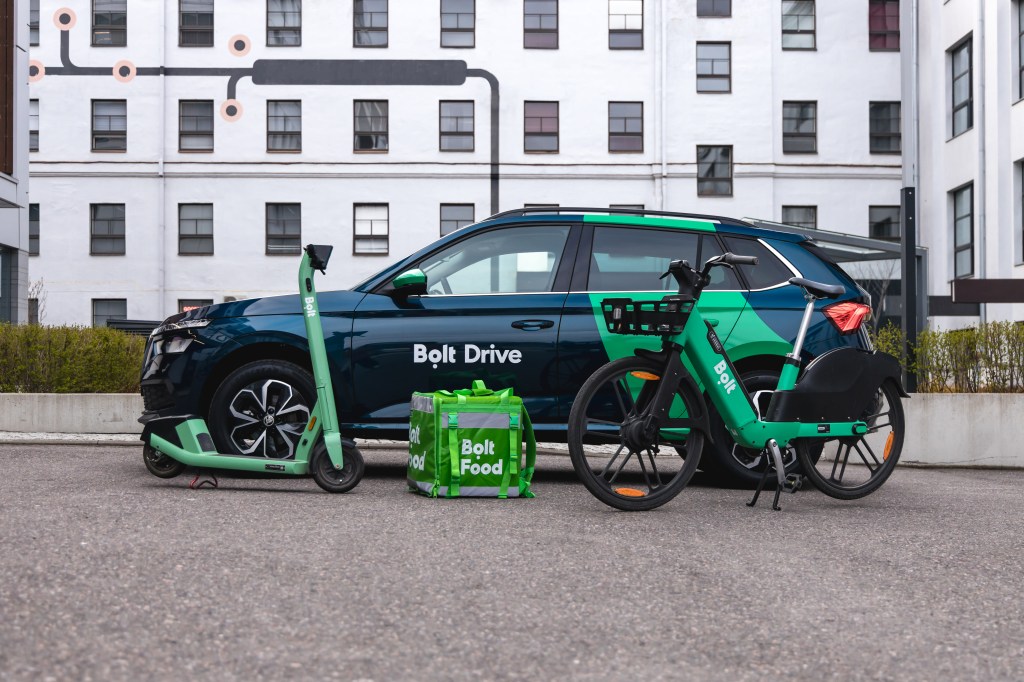Economies of scale are an essential cornerstone for on-demand companies, and to that end one of the hopefuls in the space has raised a big round to grow its business. Bolt — the startup and app of the same name that operates on-demand ride hailing, shared cars and scooters; and restaurant and grocery delivery — has raised €628 million ($709 million at current rates), at a valuation of €7.4 billion ($8.4 billion). It will be using the funds to continue expanding to new geographies and to bring more consumers and partners to its “super app”; and newer business lines, such as its 15-minute grocery delivery option Bolt Market, will be building out “dark stores” in more cities to expand the service beyond the 10 where it’s active today.
“All of our business units are growing,” founder and CEO Markus Villig said in an interview this week. Villig said that even its most mature business, ride hailing, “is seeing double digit growth,” while the newer businesses, being smaller, are expanding even faster. “The new trend of last year is that private cars are a bad thing and increasingly people want to use other forms of mobility.” He added that Bolt is working on partnering with more city governments to build out its services as part of their updated transportation strategies.
Sequoia Capital, Fidelity Management and Research Company LLC co-led the round, with Whale Rock, Owl Rock (a division of Blue Owl), D1, G Squared, Tekne, Ghisallo and other unnamed backers also participating.
The funding news caps off an eventful few months for the company, which had raised €600 million at a valuation of over €4 billion only four months earlier in a Series E also led by Sequoia. Bolt now has more than 100 million customers in 45 countries and 400+ cities using its services. As a measure of its growth, in August, when the company announced that previous round, it had 75 million customers.
Bolt’s growth is also notable considering the difficulties that some of its competitors have been facing in the wake of COVID: First the pandemic had a major chilling effect on people being willing to go into a vehicle where they have to sit in a closed-in space with another person (the driver). That situation was then compounded when things picked up again, but so quickly that many services are suffering from a shortage of drivers, not passengers.
Villig admitted that Bolt, too, faced some “short-term fluctuations” in demand when the lockdowns first started. But it has made attracting and keeping drivers a major focus by paying out better commissions than its rivals (typically, Villig said, it will pay between 10% and 20% better than competitors).
“There is a massive lack of supply on these platforms, so we have focused on taking the most partner-friendly lowest commission,” he said. That has paid off well for Bolt, which has now seen monthly revenues more than double compared to sales pre-COVID, Villig said.
Bolt was founded eight years ago in Tallinn, Estonia (originally as Taxify), with a mission to bring ride hailing to emerging markets and countries where others like Uber had yet to gain a strong foothold, a strategy that it used to expand modestly across regions like Central and Eastern Europe and Africa, in the process attracting investors like China’s Didi — itself having built a massive business in its own home emerging market. (Didi quietly divested its stake in Bolt last year.)
Over time, the focus has remained on Europe and Africa, but Bolt found that a lot of its learnings from those first launches could just as easily be applied in more developed countries, with more lucrative payoffs.
“We started off in Eastern Europe and Africa because those markets had a bigger need. They had lower car ownership, higher unemployment [making for a market with many freelance drivers]; it made sense,” said Villig. “But now we’ve learned that this model works everywhere, and it’s actually easier to grow in Western Europe because they are developed markets. We found if you can make this model work in really cheap, frugal markets, then once you go to London or Stockholm, it’s materially easier. And the unit economcis are definitely better because the prices are higher.” It’s not a perfect system, though. Working in developed markets, he said, the trade-off is “more regulations,” and the limits that come with those.
Meanwhile, Bolt’s diversification approach, moving beyond cars to scooters and couriers, and now also food delivery services, is also a part of its scaling strategy. Offering multiple services within a single app not only helps Bolt bring in new customers and cross sell to them, but it does so with essentially zero marketing costs by putting all of the options and cross-promotions within a single app, said Villig.
“Two elements that set us apart and are turning in our favor are the synergies and the shared costs between these verticals,” he said. Most of Bolt’s competitors are generally focused on one thing in each app, Villig continued, “and we are not,” so it’s easier and less expensive for Bolt to build more services off the back of each other. “Now we are passing on those savings for customers.”































Comment